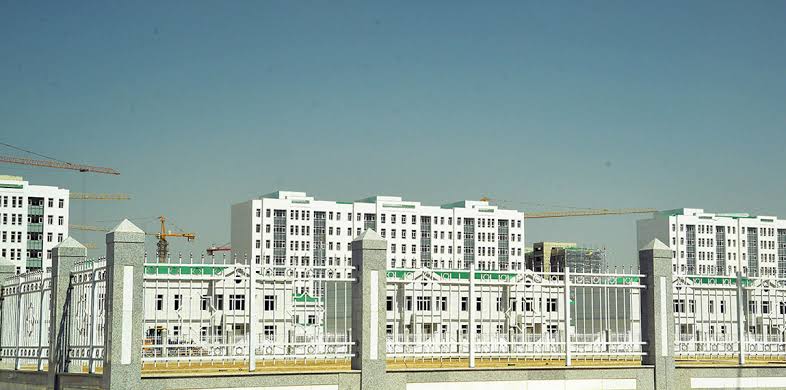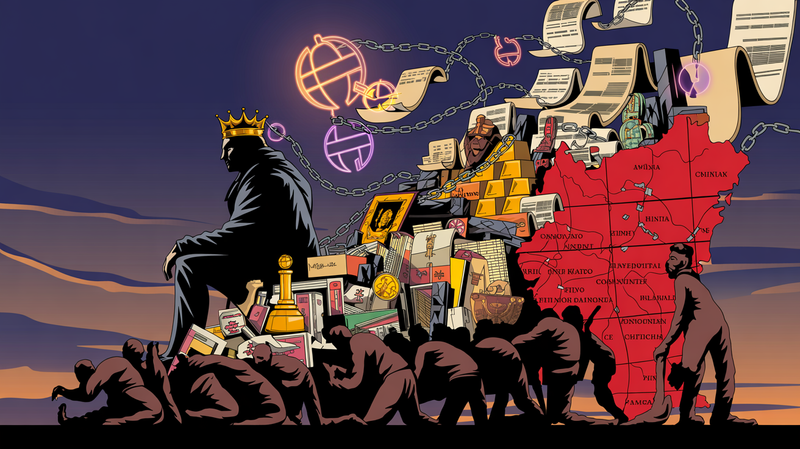Arkadag City: The Dawn of a New Era or an Orwellian Nightmare?
About a month ago, on June 29, 2023, the city of Arkadag, a brainchild of Turkmenistan's leadership, was officially unveiled. Located 30 kilometers south of the nation's capital, Ashgabat, this "smart city" was designed for a population of 70,000 and built at a

About a month ago, on June 29, 2023, the city of Arkadag, a brainchild of Turkmenistan's leadership, was officially unveiled. Located 30 kilometers south of the nation's capital, Ashgabat, this "smart city" was designed for a population of 70,000 and built at a staggering cost running into billions of dollars.
The city, planned around the concept of a "15-minute city" - an urban design principle aiming to place daily necessities within a 15-minute reach by foot or bike - presents itself as a utopian vision of urban planning. However, a closer inspection reveals that beneath the city's facade of convenience and connectivity lies a deep-rooted, unsettling reality.
Arkadag City, replete with modern 5-, 7-, and 9-story apartment buildings and 2-story cottages, utilizes a comprehensive "smart home" technology. These intelligent home management systems allow for the automation and synchronization of all home life-support and security systems in real-time via the internet. These can be remotely controlled - as far as via a smartphone - and offer access to high-speed internet through a fiber-optic communication system. The introduction of a 4G network further ensures high-quality cellular communication.
While these facilities might seem to epitomize the zenith of urban convenience, they also serve as a potent tool for surveillance. With every household process being remotely controlled, Arkadag morphs from being a smart city into a potential digital open-air prison - a city with high walls that surveillance can easily penetrate.
This issue becomes more pronounced when taking into account the mandatory participation of residents in city-wide events, the systematic control over individuals' health, and the possible repercussions of dissent. The sophisticated digital infrastructure, while providing convenience, could also become an instrument for exerting and consolidating authoritarian control.
Furthermore, the new city inaugurates a single-call 123 Service - a quick-access system to gas, fire safety, and ambulance services. Although this initiative is designed to provide prompt assistance and prevent emergencies, it also underscores the capacity of the regime to monitor individual citizens in real-time.
Thus, Arkadag City, despite being hailed as an innovative urban project and a practical application ground for students and teachers from specialized higher educational institutions, raises crucial questions about privacy, personal freedom, and the potential misuse of technology.
This paradox, of a city that promises convenience but potentially facilitates surveillance, serves as a stark reminder of the duality inherent in technological advancements. As the world grapples with the ethical implications of digitization, Arkadag City stands as a poignant exemplar of the intricate intersection between urban development, technology, and individual liberties.
George Orwell: A Prophetic Vision or Mere Coincidence?
George Orwell, born Eric Arthur Blair, is a name synonymous with dystopian literature. His critically acclaimed novels, "1984" and "Animal Farm", have painted a vivid picture of a world dominated by totalitarian regimes, surveillance, and a profound loss of individual liberties. Observing contemporary cities like Arkadag, one cannot help but marvel at Orwell's uncanny foresight. But was this foresight a product of prophetic genius or simply an extrapolation of his times?
Orwell was a keen observer of political trends and an active participant in his era's defining moments. Born in 1903, he witnessed two World Wars, the rise of totalitarian regimes, and the onset of the Cold War. His experiences as a colonial policeman in Burma and as a fighter in the Spanish Civil War exposed him to the dark underbelly of political power and its potential for abuse.
In "1984", Orwell presented a grim portrayal of a society constantly monitored by "Big Brother" and ruled by the "Party". The novel delves into themes of ubiquitous surveillance, manipulation of information, and the subversion of language to control thought - elements that are disturbingly present in our modern digital societies. The concept of a "smart city" like Arkadag, equipped with technology to monitor and control every aspect of citizens' lives, seems to bear an eerie resemblance to Orwell's Oceania.
However, attributing Orwell's visionary acuity to some clandestine knowledge is an oversimplification. There is no credible evidence to suggest Orwell was a freemason or affiliated with any secret societies. His works are better viewed as cautionary tales born out of his experiences and observations, rather than secret foreknowledge.
Orwell’s genius lies in his ability to project the potential consequences of political and technological trends, many of which have materialized in the years since his passing. As we navigate through our increasingly digitized and monitored lives, his words serve as a critical reminder of the need for constant vigilance to preserve our liberties and freedoms.
In the face of an increasingly interconnected and surveilled world, Orwell's words stand as a stark warning: "If you want a picture of the future, imagine a boot stamping on a human face—forever." As cities like Arkadag emerge and the potential for surveillance continues to grow, the global community must grapple with the ethical implications and strive to balance technological advancement with the preservation of individual freedoms.
The phrase "a boot stamping on a human face—forever" is one of the most haunting images from Orwell's "1984." It symbolizes the relentless, brutal, and dehumanizing force of totalitarian regimes. The boot represents oppressive authority, while the human face signifies the individual, the unique person with their own thoughts, desires, and rights. The act of stamping implies not just violence, but an ongoing, unceasing dominance that erodes away individuality and humanity. The word "forever" emphasizes the permanence of this oppressive scenario in a totalitarian society - an unending cycle of dominance and submission.
Returning to the context of Arkadag, this city is a significant example of the increasing tendency towards smart cities. Despite the remarkable strides in technology, infrastructure, and connectivity, there are ethical and human rights concerns that cannot be ignored. Cities like Arkadag, if unchecked and unbalanced, can indeed become a potential site for what Orwell envisioned – an overwhelming surveillance state where personal freedoms and privacy are continually compromised.
While there is no evidence of Orwellian-style suppression in Arkadag as of now, the potential for misuse of the very technology that makes the city "smart" is evident. The extent and depth of data that smart cities can gather about its residents - from their daily routines to their personal preferences - can be leveraged for oppressive surveillance and control, which in the wrong hands can morph into a digital form of "a boot stamping on a human face—forever."
In the light of these concerns, it becomes crucial to ensure the ethical use of technology and data, respect for privacy, and preservation of individual freedoms as we move towards a more interconnected, smarter future. In essence, Orwell's dystopian vision should serve as a constant reminder and a warning for societies across the globe.




